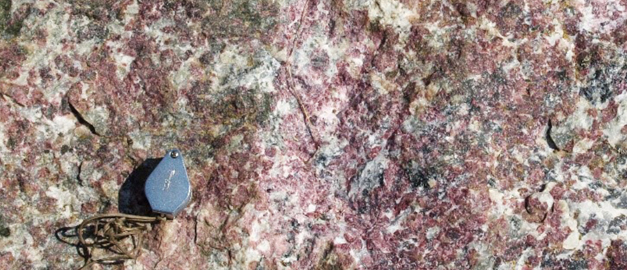
Abundant, coarsely crystallised red eudialyte (sensu lato) in outcropping pegmatitic grennaite (“PGT”), Norra Kärr. Hand lenses for scale.
Photo: Erik Jonsson, SGU
New report on rare earth elements “REEs” in Sweden
SGUs work with mapping occurrences of rare earth metals within Sweden and the EU in the EU-project EURARE has led to new knowledge about new and previously known deposits.
Rare earth element occurrences in Sweden are distributed throughout the country, although some regions are better endowed than others. Major deposit types are the apatite-iron oxide mineralisations in Norrbotten and Bergslagen, the skarns of the Riddarhyttan–Norberg belt, the Norra Kärr complex, and the Olserum and Alnö areas.
This report presents a selection of results collected by the Swedish team at SGU, within the framework of the EURARE project. The work included an extensive literature review of previous publications and reports, which led to updates of SGU’s national database with additional occurrences, as well as suggestions for new investigations. Field work activities were carried out in several REE-mineralised areas and were followed by analysis of selected mineralisations. Alongside other national geological surveys in the EU, SGU was mainly involved in the geological work undertaken. SGUs work resulted in new and updated geological information and resource data on known REE mineralisations in Sweden.
About EURARE: The EURARE project was co-funded by the European Commission (EC) under the 2012 Cooperation Work Programme for Nanotechnologies, Materials and new Production Technologies and specifically the raw materials topic NMP.2012.4.1-1 ‘New environmentally friendly approaches in minerals processing’. EURARE included activities and tasks on geological resources, mining and beneficiation, extraction and separation, and regulation in relation to REE. In addition, EURARE provides a database of currently known REE deposits within the EU. Alongside other national geological surveys in the EU, the Geological Survey of Sweden (SGU) was mainly involved in the geological work undertaken.
Read more about the EURARE project:
Download the report:
Last reviewed 2019-06-17
